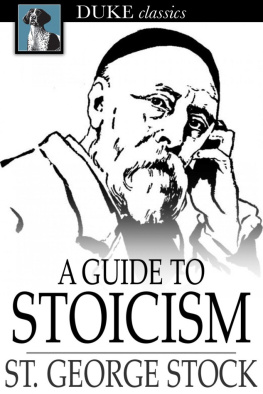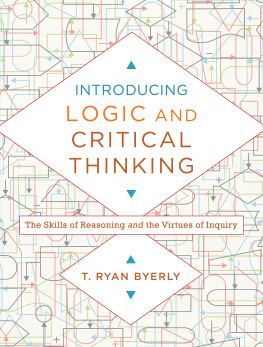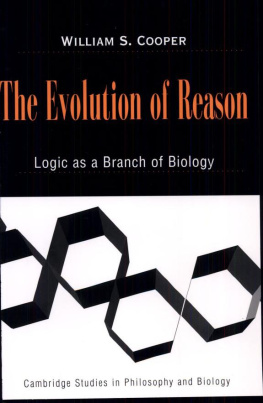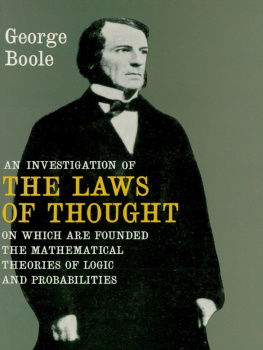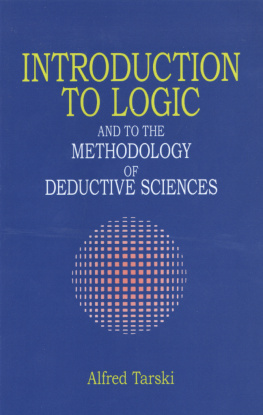St. George William Joseph Stock - Deductive Logic
Here you can read online St. George William Joseph Stock - Deductive Logic full text of the book (entire story) in english for free. Download pdf and epub, get meaning, cover and reviews about this ebook. year: 1888, genre: Science. Description of the work, (preface) as well as reviews are available. Best literature library LitArk.com created for fans of good reading and offers a wide selection of genres:
Romance novel
Science fiction
Adventure
Detective
Science
History
Home and family
Prose
Art
Politics
Computer
Non-fiction
Religion
Business
Children
Humor
Choose a favorite category and find really read worthwhile books. Enjoy immersion in the world of imagination, feel the emotions of the characters or learn something new for yourself, make an fascinating discovery.
- Book:Deductive Logic
- Author:
- Genre:
- Year:1888
- Rating:4 / 5
- Favourites:Add to favourites
- Your mark:
- 80
- 1
- 2
- 3
- 4
- 5
Deductive Logic: summary, description and annotation
We offer to read an annotation, description, summary or preface (depends on what the author of the book "Deductive Logic" wrote himself). If you haven't found the necessary information about the book — write in the comments, we will try to find it.
Deductive Logic — read online for free the complete book (whole text) full work
Below is the text of the book, divided by pages. System saving the place of the last page read, allows you to conveniently read the book "Deductive Logic" online for free, without having to search again every time where you left off. Put a bookmark, and you can go to the page where you finished reading at any time.
Font size:
Interval:
Bookmark:
The Project Gutenberg EBook of Deductive Logic, by St. George Stock
Copyright laws are changing all over the world. Be sure to check thecopyright laws for your country before downloading or redistributingthis or any other Project Gutenberg eBook.
This header should be the first thing seen when viewing this ProjectGutenberg file. Please do not remove it. Do not change or edit theheader without written permission.
Please read the "legal small print," and other information about theeBook and Project Gutenberg at the bottom of this file. Included isimportant information about your specific rights and restrictions inhow the file may be used. You can also find out about how to make adonation to Project Gutenberg, and how to get involved.
**Welcome To The World of Free Plain Vanilla Electronic Texts**
**eBooks Readable By Both Humans and By Computers, Since 1971**
*****These eBooks Were Prepared By Thousands of Volunteers!*****
Title: Deductive Logic
Author: St. George Stock
Release Date: September, 2004 [EBook #6560][Yes, we are more than one year ahead of schedule][This file was first posted on December 28, 2002]
Edition: 10
Language: English
*** START OF THE PROJECT GUTENBERG EBOOK DEDUCTIVE LOGIC ***
Produced by Arno Peters, David Moynihan, Charles Franksand the Online Distributed Proofreading Team.
[Transcriber's Note: In this plain-text rendering, .'. means therefore [alpha], [beta], , [Alpha], [Beta], for Greek symbols]
One critic, who was kind enough to look at this book in manuscript,recommended me to abandon the design of Publishing it, on the groundthat my logic was too like all other logics; another suggested to meto cut out a considerable amount of new matter. The latter advice Ihave followed; the former has encouraged me to hope that I shall notbe considered guilty of wanton innovation. The few novelties which Ihave ventured to retain will, I trust, be regarded as legitimateextensions of received lines of teaching.
My object has been to produce a work which should be as thoroughlyrepresentative of the present state of the logic of the Oxford Schoolsas any of the text-books of the past. The qualities which I have aimedat before all others have been clearness and consistency. For the taskwhich I have taken upon myself I may claim one qualificationthat ofexperience; since more than seventeen years have now elapsed since Itook my first pupil in logic for the Honour School of Moderations, andduring that time I have been pretty continuously engaged in studyingand teaching the subject.
In acknowledging my obligations to previous writers I must begin withArchbishop Whately, whose writings first gave me an interest in thesubject. The works of Mill and Hamilton have of course been freelydrawn upon. I have not followed either of those two great writersexclusively, but have endeavoured to assimilate what seemed best inboth. To Professor Fowler I am under a special debt. I had not theprivilege of personal teaching from him in logic,as I had in someother subjects; but his book fell into my hands at an early period inmy mental training, and was so thoroughly studied as to have become apermanent part of the furniture of my mind. Much the same may be saidof my relation to the late Professor Jevons's Elementary Lessons inLogic. Two other books, which I feel bound to mention with specialemphasis, are Hansel's edition of Aldrich and McCosh's Laws ofDiscursive Thought. If there be added to the foregoing Watts's Logic,Thomson's Outlines of the Laws of Thought, Bain's Deductive Logic,Jevons's Studies in Deductive Logic and Principles of Science,Bradley's Principles of Logic, Abbott's Elements of Logic, Walker'sedition of Murray, Ray's Text-book of Deductive Logic, andWeatherley's Rudiments of Logic, I think the list will be exhausted ofmodern works from which I am conscious of having borrowed. But, not toforget the sun, while thanking the manufacturers of lamps and candles,I should add that I have studied the works of Aristotle according tothe measure of my time and ability.
This work has had the great advantage of having been revised, whilestill in manuscript, by Mr. Alfred Robinson, Fellow of New College, towhom I cannot sufficiently express my obligation. I have availedmyself to the full of the series of criticisms which he was kindenough to send me. As some additions have been made since then, hecannot be held in anyway responsible for the faults which less kindlycritics may detect.
For the examples at the end I am mainly indebted to others, and to alarge extent to my ingenious friend, the Rev. W. J. Priest of MertonCollege.
My thanks are due also to my friend and former pupil, Mr. GilbertGrindle, Scholar of Corpus, who has been at the pains to compose anindex, and to revise the proofs as they passed through the press.
And last, but not least, I must set on record my gratitude toCommander R. A. Stock, R.N., one of Her Majesty's Knights of Windsor,without whose brotherly aid this work might never have been written,and would certainly not have assumed exactly its present shape.
October 22, 1888.
CHAP. I. Of the Term as distinguished from other words, 57-76.
II. Of the Division of Things, 77-85.
III. Of the Divisions of Terms, 86-165.
IV. Of the Law of Inverse Variation of Extension and Intension, 166-171.
CHAP. I. Of the Proposition as distinguished from other Sentences, 172-185.
II. Of the Copula, 186-201.
III. Of the Divisions of Propositions, 202-273.
IV. Of the Distribution of Terms, 274-294.
V. Of the Quantification of the Predicate, 295-312.
VI. Of the Heads of Predicables, 313-346.
VII. Of Definition, 347-384.
VIII. Of Division, 385-425.
CHAP. I. Of Inferences in general, 426-441.
II. Of Deductive Inferences, 442-448.
III. Of Opposition, 449-478.
IV. Of Conversion, 479-495.
V. Of Permutation, 496-502.
VI. Of Compound Forms of Immediate Inference, 503-532.
VII. Of Other Forms of Immediate Inference, 533-539.
VIII. Of Mediate Inferences or Syllogisms, 540-557.
IX. Of Mood and Figure, 558-568.
X. Of the Canon of Reasoning, 569-581.
XI. Of the General Rules of Syllogism, 582-598.
XII. Of the Determination of the Legitimate Moods of Syllogism, 599-605.
XIII. Of the Special Rules of the Four Figures, 606-620.
XIV. Of the Determination of the Moods that are valid in the Four
Figures, 621-632.
XV. Of the Special Canons of the Four Figures, 633-647.
XVI. Of the Special Uses of the Four Figures, 648-655.
XVII. Of the Syllogism with Three Figures, 656-666.
XVIII. Of Reduction, 667-700.
XIX. Of Immediate Inference as applied to Complex Propositions, 701-730.
XX. Of Complex Syllogisms, 731-743.
XXI. Of the Reduction of the Partly Conjunctive Syllogism,
744-752.
XXII. Of the Partly Conjunctive Syllogism regarded as all Immediate
Inference, 753-759.
XXIII. Of the Disjunctive Syllogism, 760-765.
XXIV. Of the Reduction of the Disjunctive Syllogism, 766-769.
XXV. Of the Disjunctive Syllogism regarded as an Immediate
Inference, 770-777.
XXVI. Of the Mixed Form of Complex Syllogism, 778-795.
XXVII. Of the Reduction of the Dilemma, 796-797.
XXVIII. Of the Dilemma regarded as an Immediate Inference, 798,799.
Next pageFont size:
Interval:
Bookmark:
Similar books «Deductive Logic»
Look at similar books to Deductive Logic. We have selected literature similar in name and meaning in the hope of providing readers with more options to find new, interesting, not yet read works.
Discussion, reviews of the book Deductive Logic and just readers' own opinions. Leave your comments, write what you think about the work, its meaning or the main characters. Specify what exactly you liked and what you didn't like, and why you think so.



